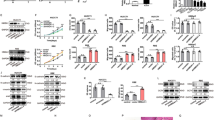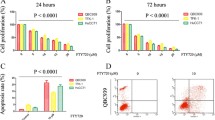Abstract
Purpose
Hilar cholangiocarcinoma (Klatskin tumor) is one of the most difficult cancers to treat. We demonstrate activation of phosphoinositide-3-kinase (PI3K)/Akt signaling, which is a critical pathway for cell survival, in hilar cholangiocarcinoma cells. However, inhibition of PI3K has little effect on hilar cholangiocarcinoma cell survival. In this study, we investigated the mechanism by which hilar cholangiocarcinoma cells resist PI3K inhibitors.
Methods
Human hilar cholangiocarcinoma cells KKU-100 were treated with PI3K inhibitors, and cell viability and apoptosis assays were performed. The expression of a MAPK phosphatase (MKP-1) that contributes to cancer cell survival in response to multiple stress stimuli was assayed by quantitative real-time RT-PCR and western blotting. In addition, the effects of the MKP-1 inhibitor were studied in KKU-100 cells treated with PI3K inhibitors.
Results
Incubation of KKU-100 cells with PI3K inhibitors resulted in increased expression of MKP-1. Furthermore, we found that inhibition of MKP-1 using siRNA silencing sensitized KKU-100 cells to PI3K inhibitor-induced apoptosis via increased phosphorylation of p38 MAPK.
Conclusions
These results indicate that concurrent inhibition of PI3K and MKP-1 induces apoptosis in KKU-100 cells. Simultaneous targeting of the PI3K pathway and MKP-1 may be a useful approach to improve therapies directed against hilar cholangiocarcinoma.





Similar content being viewed by others
Abbreviations
- MAPK:
-
Mitogen-activated protein kinases
- MKP-1:
-
MAPK phosphatase-1
- PI3K:
-
Phosphoinositide-3-kinase
References
Akoad M, Jenkins R (2008) Proximal biliary malignancy. Surg Clin North Am 88(6):1409–1428
Boutros T, Chevet E, Metrakos P (2008) Mitogen-activated protein (MAP) kinase/MAP kinase phosphatase regulation: roles in cell growth, death, and cancer. Pharmacol Rev 60(3):261–310
Chattopadhyay S, Machado-Pinilla R, Manguan-Garcia C, Belda-Iniesta C, Moratilla C, Cejas P, Fresno-Vara JA, de Castro-Carpeno J, Casado E, Nistal M, Gonzalez-Baron M, Perona R (2006) MKP1/CL100 controls tumor growth and sensitivity to cisplatin in non-small-cell lung cancer. Oncogene 25(23):3335–3345
Cheng B, Rhodus NL, Williams B, Griffin RJ (2004) Detection of apoptotic cells in whole saliva of patients with oral premalignant and malignant lesions: a preliminary study. Oral Surg Oral Med Oral Pathol Oral Radiol Endod 97(4):465–470
Chung JY, Hong SM, Choi BY, Cho H, Yu E, Hewitt SM (2009) The expression of phospho-AKT, phospho-mTOR, and PTEN in extrahepatic cholangiocarcinoma. Clin Cancer Res 15(2):660–667
Cortes-Sempere M, Chattopadhyay S, Rovira A, Rodriguez-Fanjul V, Belda-Iniesta C, Tapia M, Cejas P, Machado-Pinilla R, Manguan-Garcia C, Sanchez-Perez I, Nistal M, Moratilla C, Castro-Carpeno JD, Gonzalez-Baron M, Albanell J, Perona R (2009) MKP1 repression is required for the chemosensitizing effects of NF-kappaB and PI3 K inhibitors to cisplatin in non-small cell lung cancer. Cancer Lett 286(2):206–216
Franklin CC, Srikanth S, Kraft AS (1998) Conditional expression of mitogen-activated protein kinase phosphatase-1, MKP-1, is cytoprotective against UV-induced apoptosis. Proc Natl Acad Sci USA 95(6):3014–3019
Givant-Horwitz V, Davidson B, Goderstad JM, Nesland JM, Trope CG, Reich R (2004) The PAC-1 dual specificity phosphatase predicts poor outcome in serous ovarian carcinoma. Gynecol Oncol 93(2):517–523
Keyse SM (2008) Dual-specificity MAP kinase phosphatases (MKPs) and cancer. Cancer Metastasis Rev 27(2):253–261
Kim GS, Choi YK, Song SS, Kim WK, Han BH (2005) MKP-1 contributes to oxidative stress-induced apoptosis via inactivation of ERK1/2 in SH-SY5Y cells. Biochem Biophys Res Commun 338(4):1732–1738
Leelawat K, Leelawat S, Narong S, Hongeng S (2007) Roles of the MEK1/2 and AKT pathways in CXCL12/CXCR4 induced cholangiocarcinoma cell invasion. World J Gastroenterol 13(10):1561–1568
Leelawat K, Narong S, Udomchaiprasertkul W, Leelawat S, Tungpradubkul S (2009) Inhibition of PI3 K increases oxaliplatin sensitivity in cholangiocarcinoma cells. Cancer Cell Int 8(9):3
Lin YW, Chuang SM, Yang JL (2003) ERK1/2 achieves sustained activation by stimulating MAPK phosphatase-1 degradation via the ubiquitin–proteasome pathway. J Biol Chem 278(24):21534–21541
Mazhar D, Stebbing J, Bower M (2006) Chemotherapy for advanced cholangiocarcinoma: what is standard treatment? Future Oncol 2(4):509–514
Miller AL, Webb MS, Copik AJ, Wang Y, Johnson BH, Kumar R, Thompson EB (2005) p38 Mitogen-activated protein kinase (MAPK) is a key mediator in glucocorticoid-induced apoptosis of lymphoid cells: correlation between p38 MAPK activation and site-specific phosphorylation of the human glucocorticoid receptor at serine 211. Mol Endocrinol 19(6):1569–1583
Obata T, Brown GE, Yaffe MB (2000) MAP kinase pathways activated by stress: the p38 MAPK pathway. Crit Care Med 28(4 Suppl):67–77
Orlowski RZ, Small GW, Shi YY (2002) Evidence that inhibition of p44/42 mitogen-activated protein kinase signaling is a factor in proteasome inhibitor-mediated apoptosis. J Biol Chem 277(31):27864–27871
Rojo F, Gonzalez-Navarrete I, Bragado R, Dalmases A, Menendez S, Cortes-Sempere M, Suarez C, Oliva C, Servitja S, Rodriguez-Fanjul V, Sanchez-Perez I, Campas C, Corominas JM, Tusquets I, Bellosillo B, Serrano S, Perona R, Rovira A, Albanell J (2009) Mitogen-activated protein kinase phosphatase-1 in human breast cancer independently predicts prognosis and is repressed by doxorubicin. Clin Cancer Res 15(10):3530–3539
Sano T, Shimada K, Sakamoto Y, Ojima H, Esaki M, Kosuge T (2008) Prognosis of perihilar cholangiocarcinoma: hilar bile duct cancer versus intrahepatic cholangiocarcinoma involving the hepatic hilus. Ann Surg Oncol 15(2):590–599
Sasaki T, Isayama H, Nakai Y, Ito Y, Kogure H, Togawa O, Toda N, Yasuda I, Hasebe O, Maetani I, Sasahira N, Hirano K, Tsujino T, Tada M, Omata M (2009) Multicenter, phase II study of gemcitabine and S-1 combination chemotherapy in patients with advanced biliary tract cancer. Cancer Chemother Pharmacol. doi:10.1007/s00280-009-1115-5
Schliess F, Kurz AK, Haussinger D (2000) Glucagon-induced expression of the MAP kinase phosphatase MKP-1 in rat hepatocytes. Gastroenterology 118(5):929–936
Shi YY, Small GW, Orlowski RZ (2006) Proteasome inhibitors induce a p38 mitogen-activated protein kinase (MAPK)-dependent anti-apoptotic program involving MAPK phosphatase-1 and Akt in models of breast cancer. Breast Cancer Res Treat 100(1):33–47
Small GW, Shi YY, Edmund NA, Somasundaram S, Moore DT, Orlowski RZ (2004) Evidence that mitogen-activated protein kinase phosphatase-1 induction by proteasome inhibitors plays an antiapoptotic role. Mol Pharmacol 66(6):1478–1490
Small GW, Shi YY, Higgins LS, Orlowski RZ (2007) Mitogen-activated protein kinase phosphatase-1 is a mediator of breast cancer chemoresistance. Cancer Res 67(9):4459–4466
Sripa B, Leungwattanawanit S, Nitta T, Wongkham C, Bhudhisawasdi V, Puapairoj A, Sripa C, Miwa M (2005) Establishment and characterization of an opisthorchiasis-associated cholangiocarcinoma cell line (KKU-100). World J Gastroenterol 11(22):3392–3397
Starkey SJ, Grant AL, Hagan RM (2001) A rapid and transient synthesis of nitric oxide (NO) by a constitutively expressed type II NO synthase in the guinea-pig suprachiasmatic nucleus. Br J Pharmacol 134(5):1084–1092
Takeuchi K, Shin-ya T, Nishio K, Ito F (2009) Mitogen-activated protein kinase phosphatase-1 modulated JNK activation is critical for apoptosis induced by inhibitor of epidermal growth factor receptor-tyrosine kinase. FEBS J 276(5):1255–1265
Vicent S, Garayoa M, Lopez-Picazo JM, Lozano MD, Toledo G, Thunnissen FB, Manzano RG, Montuenga LM (2004) Mitogen-activated protein kinase phosphatase-1 is overexpressed in non-small cell lung cancer and is an independent predictor of outcome in patients. Clin Cancer Res 10(11):3639–3649
Wang J, Zhou JY, Zhang L, Wu GS (2009) Involvement of MKP-1 and Bcl-2 in acquired cisplatin resistance in ovarian cancer cells. Cell Cycle 8(19):3191–3198
Widenmaier SB, Ao Z, Kim SJ, Warnock G, McIntosh CHS (2009) Suppression of p38 MAPK and JNK via Akt-mediated inhibition of apoptosis signal-regulating kinase 1 constitutes a core component of the beta-cell pro-survival effects of glucose-dependent insulinotropic polypeptide. J Biol Chem 284(44):30372–30382
Wu GS (2007) Role of mitogen-activated protein kinase phosphatases (MKPs) in cancer. Cancer Metastasis Rev 26(3–4):579–585
Yang WL, Zhang XC, Zhang DW, Tong BF (2007) Diagnosis and surgical treatment of hepatic hilar cholangiocarcinoma. Hepatobiliary Pancreat Dis Int 6(6):631–635
Yoon JH, Canbay AE, Werneburg NW, Lee SP, Gores GJ (2004) Oxysterols induce cyclooxygenase-2 expression in cholangiocytes: implications for biliary tract carcinogenesis. Hepatology 39(3):732–738
Acknowledgments
This study was funded by Chulabhorn Hospital and Rajavithi Hospital.
Conflict of interest statement
The authors declare that they have no competing interests.
Author information
Authors and Affiliations
Corresponding author
Rights and permissions
About this article
Cite this article
Leelawat, K., Udomchaiprasertkul, W., Narong, S. et al. Induction of MKP-1 prevents the cytotoxic effects of PI3K inhibition in hilar cholangiocarcinoma cells. J Cancer Res Clin Oncol 136, 1537–1544 (2010). https://doi.org/10.1007/s00432-010-0811-1
Received:
Accepted:
Published:
Issue Date:
DOI: https://doi.org/10.1007/s00432-010-0811-1




